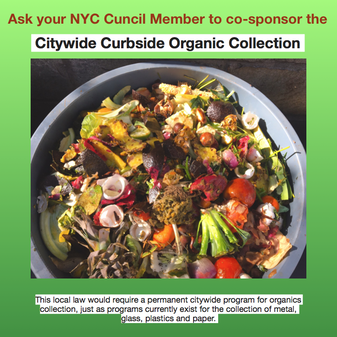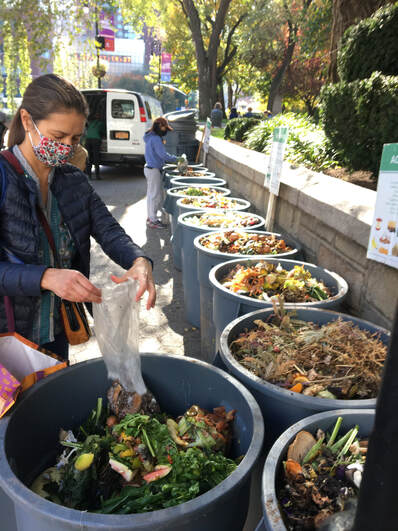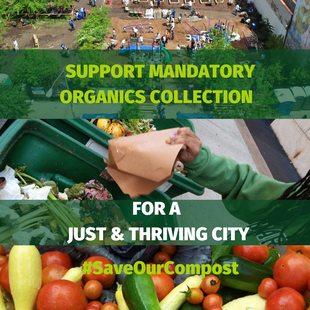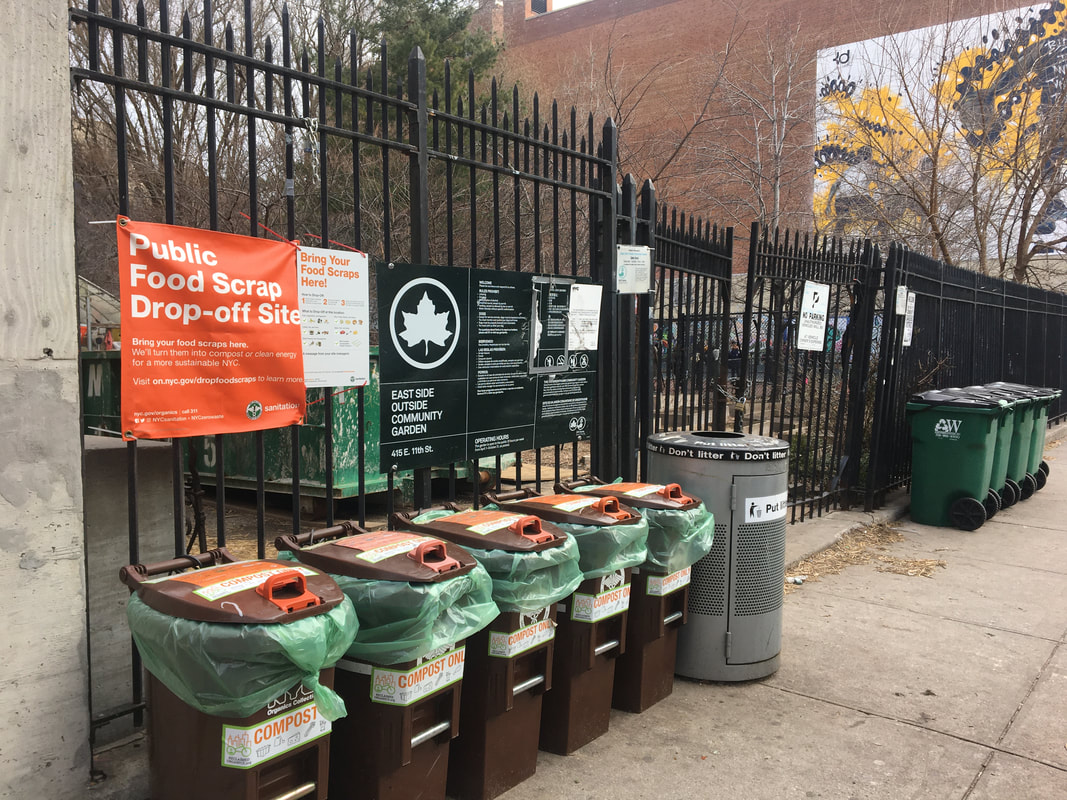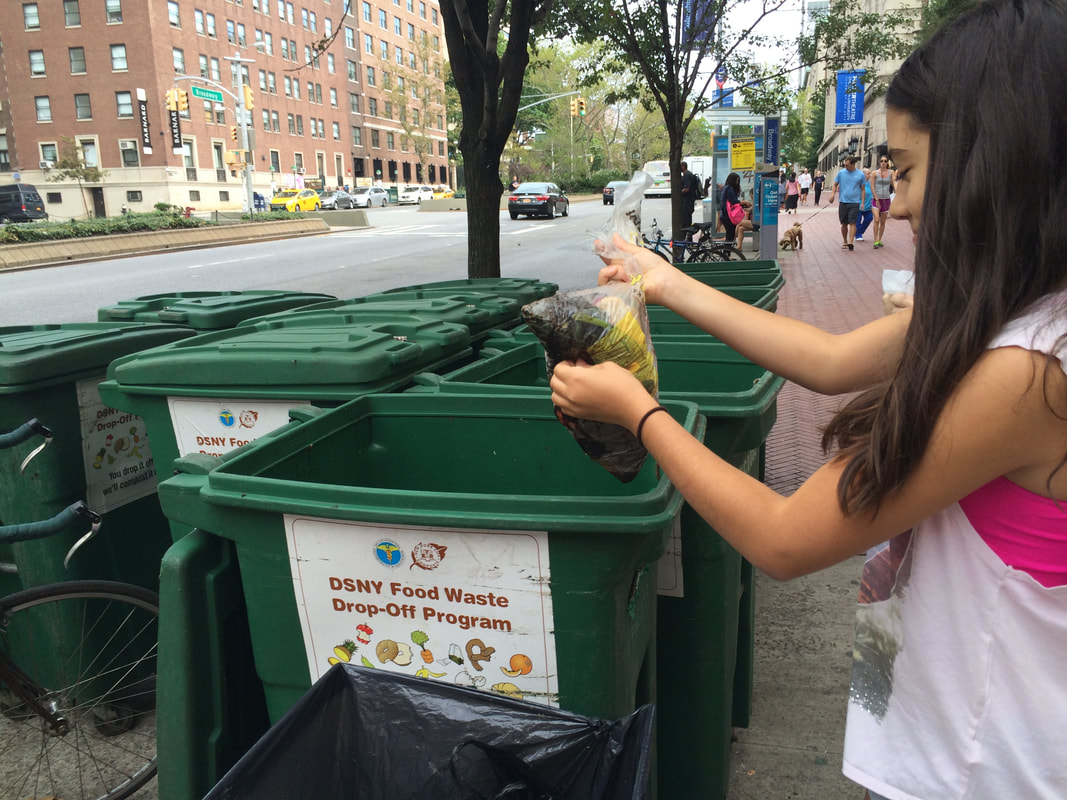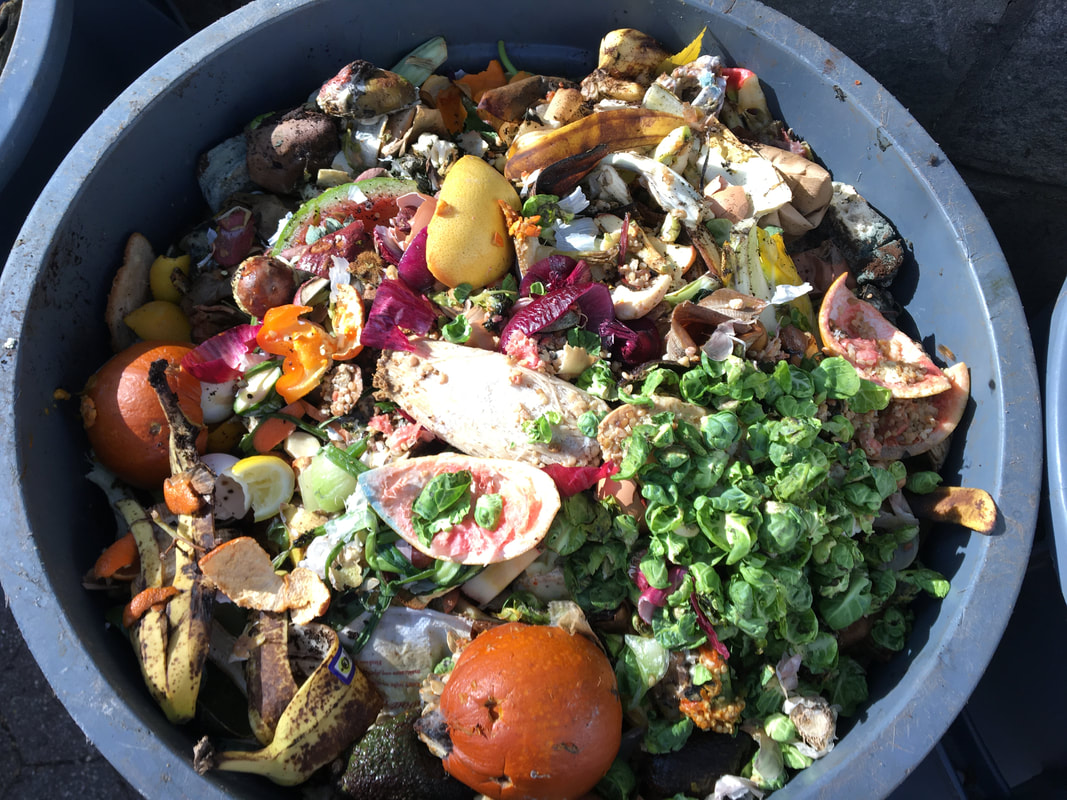Save Our Compost NYC
Contact your NYC COUNCIL MEMBER
and ask them to sign onto Intro 0244, the bill to create a
citywide curbside organics program
(find your NYC Council Member -->)
ALL NYC public school students deserve the right to cafeteria composting,
as well as climate education that includes food scrap recycling benefits!
Let's make sure these funds are included in the NYC Budget.
as well as climate education that includes food scrap recycling benefits!
Let's make sure these funds are included in the NYC Budget.
|
"Composting is good for our environment, and economy, and its expansion to every corner of our City is long overdue,” -- Council Member Shahana Hanif.
"Get NYC’s Food Waste Out of Landfills and Incinerators" NRDC
New Yorkers discard as much as 4,000 tons a day of food scraps, yard waste and food-soiled paper. It’s one third of the entire residential waste stream. But when these organics are buried in landfills, they generate methane – a potent global warming gas. And when sent to incinerators, this trash, with its high moisture content, fouls the burning process; the result – even more air emissions. What is needed without delay is legislation that will phase in universal, mandatory food waste collections at curbside for every city neighborhood. This is how composting collections have succeeded in cities like San Francisco, Seattle and Portland. And to get the ball rolling as the FY’23 budget is finalized, the Council and Mayor should provide funds for food waste collections at every city public school, beginning in September. - EXPERT BLOG › ERIC A. GOLDSTEIN NRDC, An Earth Day “To Do” List for NYC’s Mayor & Council Speaker April 20, 2022 NYC needs everyone's support for citywide curbside composting! WHY?
Composting is one of the easiest things that NYC can do to reduce our greenhouse gas emissions and fight climate change. Methane released by landfilling organic waste accounts for 17.4% of US methane emissions. Methane is 80 times more potent than carbon dioxide as a climate change contributor over 20 years. The UN has identified methane reduction as essential to slow climate change in this decade as part of the Global Methane Pledge. Black, Brown and NYCHA communities are still mostly left out of city's composting plan, perpetuating waste management inequity. Please contact your New York City Council Member and let them know that composting is essential to fighting climate change in NYC. Ask them to sign onto Intro 0244, the bill to create a citywide curbside organics program for residential buildings. with outreach and education. -- 21 NYC Council Members have already signed onto the bill. If your Council Member has, please thank them! Thank you, NYC Council Member Shahana Hanif, for introducing this important legislation. |
Cafeteria Culture is proud to be a part of the
#SaveOurCompost NYC Coalition
Keep scrolling to learn why
|
Reducing the millions of tons of solid waste we send to landfills and incinerators annually is critical to reducing air pollution in Black and Latinx communities most vulnerable to Covid-19, curbing the substantial greenhouse gas emissions caused by waste disposal, and sustaining and creating thousands of good, local green jobs in operations like composting and processing recyclables. --- Justin Wood, New York Lawyers for the Public Interest (NYLPI) LEARN MORE:
NYC Must Enact a Universal Food Waste Composting Law-Part II - an outline and timeline for NYC Council 5 year plan NRDC Blog post, By Eric A. Goldstein, February 08, 2022 NYC Must Enact a Universal Food Waste Composting Law - background & why every NYC household needs composting services NRDC Blog post, By Eric A. Goldstein, February 01, 2022 |
|
From the new report, METHANE MATTERS, March 2022
(https://changingmarkets.org and GAIA) Abstract: https://changingmarkets.org/portfolio/growing-the-good/ According to the UN Environment Programme’s Global Methane Assessment (GMA), methane emissions should be reduced by at least 45% in this critical decade of climate action 4.3.3. Reducing further climate emissions
|
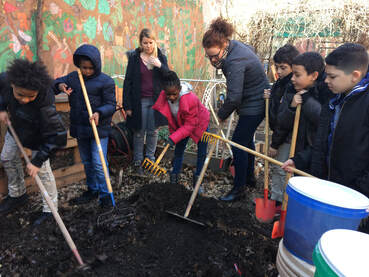
After collecting and fermenting their school food scraps (Effective Microorganism composting), 5th grade students from PS 34 Franklin D Roosevelt learn how to trench the food scraps at the El Sol Brilliante 12th Street Children's Garden, as part of Cafeteria Culture's Zero Waste/Climate Action program. Community composting sites are critical resources for teaching students and neighbors about the value of composting.
|
|
Compost is essential for a resilient, zero waste, healthy future for our children. Composting reduces our garbage to landfills and incinerators, builds soil, creates local green jobs, sequesters carbon, and in schools, it provides youth with a daily in-school climate action! ------------- Share these actions with your friends, neighbors and colleagues. Post a message Social Media: #saveourcompost #nyc #sustainability #composting |
|
NYC Department of Sanitation (DSNY) was collecting 308,600 pounds of organics (food scraps, yard waste, and other material) for recycling (composting or anaerobically digesting) every day. See NYC Department of Sanitation’s latest (2017) annual report. For Schools, 51% of the waste was suitable for organics, residential, 34% and NYCHA, 32%. ---- More from Big ReUse- > |
COMPOSTING IS ESSENTIAL
|
The way to save money is to expand the program, not cut it! We must plan for a climate-smart future by reducing our solid waste to protect lower income and Black and Brown communities who bear the burden of our landfill and incinerator bound garbage. NYC spends about 1/2 a billion tax dollars annually to export our garbage to out-of-state incinerators and landfills with a rapidly rising price tag. Food waste and organics account for 1/3 of our waste stream. Reverting to a “food waste is trash” culture will not only increase methane emissions, a potent greenhouse gas that is 84 times greater than CO2 per unit of mass over a 20 year period (see UN website on Methane and the IPCC report). It will set us back years in the effort to educate communities on zero waste. Our children and vulnerable communities deserve better. Organics make up about 1/3 of our city's waste stream. Whether sent to landfills or incinerators, food scraps as trash contribute significantly to greenhouse gas (GHG) emissions. This is the perfect time to create more "green" jobs and to push forward with a citywide mandate of compost collection as part of plan for mitigating the climate crisis. |
|
Compost More, NYC, NY Daily News Opinion June 14, 2020, Brendan Sexton, Tok Oyewole, and Eric Goldstein "But organics (food scraps, yard waste and food-soiled paper) amount to one-third of the city’s household trash. Dumping these materials into landfills or incinerators adds air pollution, boosts global warming and wastes valuable resources.... Significantly, composting can save tens of millions of taxpayer dollars annually, once larger numbers of New Yorkers participate in the program. It is cheaper to haul organics to nearby composting facilities than to have them shipped to distant landfills and incinerators, at a cost of nearly $130 a ton." |
Inside Climate News - Residents fight to Keep Composting from Getting Trashed in NYC, June 12, 2020 "... Debby Lee Cohen, founder and executive director of Cafeteria Culture, a school-based recycling program, said that suspension of composting would undoubtedly set back the city's "hard-earned progress" toward meeting its waste goal."d New York City Must Keep and Expand Organics Collection, It’s an Essential Service, OPINION , GOTHAM GAZETTE May 13, 2020 | by Gale Brewer & Antonio Reynoso |
|
Cafeteria Culture Testimony - June 15, 2020
New York City Council Hearing; Regarding Intros 1942 and 1943, the CORE Act Good afternoon, Chairman Reynoso and members of the Sanitation and Solid Waste Committee. On behalf of Cafeteria Culture (CafCu), I strongly urging the City Council to pass Intros 1942 and 1943, the CORE Act, to ensure that our City’s residents can continue to engage is some form of organics recycling and composting by immediately restoring the $7 million dollars of funding to our community-based compost drop-offs and education programs run by DSNY. CafCu is especially supportive of the bill’s proposed plan for at least three accessible and equitably sited recycling drop off sites to be located in each community, including those who have been previously left out City recycling opportunities, ensuring the long overdue opportunity for public housing and lower income communities to participate in such programs close to home. Cafeteria Culture (CafCu), founded as Styrofoam Out of Schools, is an environmental education organization that works with creatively youth to achieve equitable zero waste, climate smart school communities and a plastic free biosphere. Students in our programs, overwhelmingly from lower income communities of color and living in public housing, are providing an urgently needed voice to our City’s zero waste and climate movement. Our award winning “Cafeteria Ranger” service learning programs and “Garbology 101”, taught by our team to over 12,000 students in 20+ NYC schools and shared for free with all NYC schools, helped to launch and support the City’s first school composting pilot programs. Students take on leadership roles during the lunch period and conduct waste audits and use their data to Inform policy, bridging the connection between our consumption and garbage to environmental justice and climate change. Organics Collection, Environmental Justice and Education The Administration’s decision to slash the DSNY budget, including cutting the $28 million for composting organic waste and recycling education and outreach, is one giant step backwards in our efforts to mitigate the climate crisis. What we “save” now, will surely cost us dearly in the near future. The elimination of all forms of City supported organics collection translates into more garbage being transported to waste transfer stations in the South Bronx, North Brooklyn and Southeast Queens, as well as to the Covanta incinerator in Newark, NJ, all environmental justice communities, or “sacrifice zones,” that are already disproportionately impacted by our City’s garbage. Local or community composting sites are ideal places to teach about the awe-inspiring beauty of the composting process, replacing the uninformed “yuk’ reaction with revelatory awe. The Cafcu team has witnessed this stunning educational “aha” moment many times simply by taking students on walking field trips to community gardens. Kids and adults alike put their hands into finished compost, smell its lush earthiness (often for the first time), and behold the bounty of the garden. Every community deserves a composting site. Our 10 years of experience on teaching about waste equity, researching local urban composting in Tokyo, and partnering with youth and schools on the piloting of innovate zero waste solutions has informed one of our core principles: the future of NYC solid waste management must include local solutions for all. Ensuring that some of the local drop-off sites specified within the CORE Act also serve as sites that can locally process organics will bring us one step closer to this vision. Long Term Consequences and Future Benefits Budget cuts for citywide composting are short sighted and dangerous. The long-term implications of such budget cuts will no doubt set the City way back on our hard earned progress towards zero waste, as well as sustainable behavioral changes for many of our City’s residents. We are still recovering from similar setbacks caused by the recycling cuts after 9/11. The climate crisis may soon overshadow the pandemic and we cannot risk another 20 year recovery period to rebuild the groundwork for a composting culture for ALL City residents. Food scraps and organics account for roughly a third of our waste stream. Our rapidly rising price tag of almost 1/2 a billion tax dollars annually to export our garbage to (mostly) out-of-state incinerators and landfills is not disappearing. Over time, budget cuts to the organics collection can only drive this cost higher and more rapidly, while simultaneously increasing our City’s greenhouse gas emissions. Additionally, restoring and maintaining City Council funding for zero waste education and outreach at this time is critical. We must ensure that all New Yorkers, especially our children from lower income communities and communities of color are provided with educational opportunities that bridge the connection between food as garbage and the climate crisis. We have no time to waste. We hope that the CORE Act is passed as soon as possible, setting the stage for the long term, climate smart solution of mandatory citywide composting for all City schools and residents, keeping food waste out of landfills and incinerators. Investing in recycling and organics collection with robust education and outreach to support these efforts is critical for curbing our City’s carbon and methane emissions . With the Coronavirus starkly highlighting our city’s sacrifice zones, topped by the Trump administration’s EPA rollbacks on air and climate pollution, we must do everything possible - right now - to end environmental and racial injustices in New York City, including how we manage our solid waste. Let’s ensure the right to clean air and a healthy future for our most vulnerable children and communities. A special thank you to Council Members Powers and Reynoso for listening to the community’s outcry against the recent organics collection budget cuts and for your excellent leadership on this issue. Thank you, Debby Lee Cohen Cafeteria Culture, Executive Director/ Founder, CafeteriaCulture.org Co-Director/Producer, MicroplasticMadness.org - a movie and impact campaign for a plastic free future |
|
| |||||||||||||

